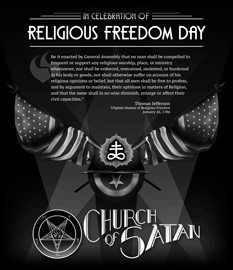In 1992, the US Congress deemed January 16th as Religious Freedom Day in celebration of the Virginia Statute for Religious Freedom passed on January 16 of 1786. This act is a significant precursor of the Establishment Clause and Free Exercise Clause of the First Amendment to the United States Constitution.
The full text of the act can be read here. Let me extract its final paragraph:
“Be it enacted by General Assembly that no man shall be compelled to frequent or support any religious worship, place, or ministry whatsoever, nor shall be enforced, restrained, molested, or burthened in his body or goods, nor shall otherwise suffer on account of his religious opinions or belief, but that all men shall be free to profess, and by argument to maintain, their opinions in matters of Religion, and that the same shall in no wise diminish, enlarge or affect their civil capacities. And though we well know that this Assembly elected by the people for the ordinary purposes of Legislation only, have no power to restrain the acts of succeeding Assemblies constituted with powers equal to our own, and that therefore to declare this act irrevocable would be of no effect in law; yet we are free to declare, and do declare that the rights hereby asserted, are of the natural rights of mankind, and that if any act shall be hereafter passed to repeal the present or to narrow its operation, such act will be an infringement of natural right.”
I find the above final paragraph significant in that it mandates tolerance for any religious position as well as the ability to refrain from participation in any religious institution without diminution of civil rights. Your personal position on this subject is thereby guaranteed to be your sovereign choice, for which there will be no civil consequences. It fundamentally supports not only pluralism of religious belief, but is also worded in such a manner that it allows for one’s opinion on religious matters to be non-belief, and thus the non-participation in “any religious worship, place, or ministry whatsoever.”
It further recognizes that subsequent legislation might limit or overthrow this broad freedom, but then states to resist such amendment, that any abrogation of such would be in defiance of natural rights, which are considered by those who authored the Virginia Statute to be inherent and thus inalienable. We Satanists understand that all rights are privileges granted by society and its governing bodies—but the sentiment here is that this manner of freedom must be considered essential to human society. I personally consider it to be a necessary element of any social contract that I would endorse, and I applaud the spirit and intention of the composers of this enactment.
All who cherish self-determination can find common cause to celebrate this day, as this unlimited intellectual autonomy is a rare and precious thing when observing human history, and not only should it be cherished, but cultivated as an essential aspect for human civilization.
—Magus Peter H. Gilmore


